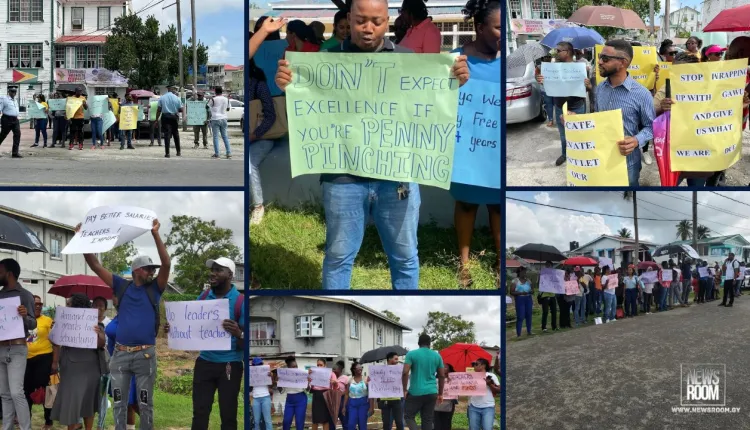Scores of teachers are on strike across the country as part of industrial action planned by the Guyana Teachers’ Union (GTU).
While some teachers have opted to stay in their classrooms and not teach, others have taken to the streets in their respective regions, picketing Ministry of Education buildings.
Official figures on the number of teachers engaging in protest action are not yet available.
In Central Georgetown, outside of the Ministry of Education’s Brickdam office, there were about 50 teachers with placards, calling for better salaries and more duty-free concessions. These calls are part of a multi-year agreement the Union proposed to the Education Ministry in 2020.
Leon Bishop, Head of Department at the West Ruimveldt Secondary School, said he was participating in the protest because teachers are in need of higher salaries and additional benefits.
Another teacher at the protest, Sharon McAllister lamented that many teachers are burdened by numerous loans because their salaries don’t sufficiently meet their expenses.
Similar protest actions were held in other regions and the teachers were vocal about the main issue, a salary increase.
The teachers protesting outside the Brickdam office were joined by GTU leaders including its President, Mark Lyte and General Secretary, Coretta McDonald.
“We submitted a proposal since 2020 and this is 2024.
“But what we’ve recognised they’ve been doing over the years is that they’ve been pulling from the conditions we’ve been asking for, tweaking them and my good friend (the Chief Education Officer) Saddam Hussain is putting out all kinds of things suggesting that the GTU is asking for 41 things and they’ve already been satisfied 21 or 27 things, something like that,” McDonald told reporters.
In a letter issued last week, Mr. Hussain said the strike recommended is “unexplainable and incongruous considering the relationship between the Ministry of Education (MoE) and the GTU.”
According to him, that negotiations are still ongoing with the GTU and since then, over 20 changes were implemented by the Ministry for the benefit of teachers.
Meanwhile, McDonald said the Union is calling for the Education Ministry to meet with the Union and hammer out the issues being proposed.
And she said, should teachers’ salaries face any deductions because the strike action has been deemed illegal, “corporate bodies” have indicated a willingness to render assistance.
Last week, both the Minister of Labour Joseph Hamilton and Education Minister Priya Manickchand told the News Room that the strike isn’t legal because the conditions haven’t been met.
According to Hamilton, engagements between the Ministry of Education and the GTU on the proposed Multi-Year Agreement that includes salary increases have not broken down, so by law the Union cannot call for the Labour Ministry to intervene in an arbitration process.
And if that cannot be done, he said an industrial action now would not be legal.
In such cases, the parties would first engage in discussions and negotiations as has been the case between the Education Ministry and the Union. If that doesn’t work out well, a process of conciliation follows; this helps both parties to develop their own proposed solutions. Then, there is mediation which involves the support of a neutral third party.
Arbitration is the final phase of such engagements. Through this, the parties settle their disagreement by putting the matter to arbitrators who make a binding decision on the matter.










